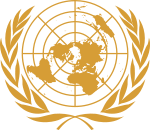- United Nations General Assembly resolution
-
A United Nations General Assembly Resolution is voted on by all member states of the United Nations in the General Assembly.
General Assembly resolutions usually require a simple majority (50% of all votes plus one) to pass. However, if the General Assembly determines that the issue is an "important question" by a simple majority vote, then a two-thirds majority is required; "important questions" are those that deal significantly with maintenance of international peace and security, admission of new members to the United Nations, suspension of the rights and privileges of membership, expulsion of members, operation of the trusteeship system, or budgetary questions.
Although General Assembly resolutions are generally non-binding towards member states, internal resolutions may be binding on the operation of the General Assembly itself, for example with regard to budgetary and procedural matters.
Notable General Assembly resolutions
- 1946
- Resolution 1: Established the United Nations Atomic Energy Commission (UNAEC) "to deal with the problems raised by the discovery of atomic energy" and tasked to "make specific proposals... for the elimination from national armaments of atomic weapons and of all other major weapons adaptable to mass destruction", among other issues regarding nuclear technology.
- 1947
- Resolution 177: International Law Commission was directed to "formulate the principles of international law recognized in the Charter of the Nuremberg Tribunal and in the judgment of the Tribunal." This resulted in the creation of the Nuremberg Principles.
- Resolution 181: The 1947 UNGA 'Partition resolution' regarding the British Mandate of Palestine.
- 1948
- Resolution 194: Recommends the "Right of return" for Palestinian refugees and for Jewish refugees.
- Resolution 260: Convention on the Prevention and Punishment of the Crime of Genocide.
- 1949
- Resolution 273: Admits the State of Israel to membership in the United Nations.
- Resolution 289: On the Question of the disposal of the former Italian colonies: recommending that Libya should be independent not later than January 1, 1952[1]
- 1950
- Resolution 377 A: The "Uniting for Peace" Resolution
- 1952
- Resolution 505: Threats to the political independence and territorial integrity of China (Republic of China) and to the peace of the Far East, resulting from Soviet violations of the Sino-Soviet Treaty of Friendship and Alliance of 14 August 1945 and from Soviet violations of the Charter of the United Nations
- 1960
- Resolution 1514: Declaration on the granting of independence to colonial countries and peoples.
- Resolution 1541: United Nations definition of what a colony is, and what self-determination is. Principles which should guide Members in determining whether or not an obligation exists to transmit the information called for under Article 73 e of the Charter.
- 1962
- Resolution 1761: Recommended sanctions against South Africa in response to the governments policy of apartheid.
- 1963
- Resolution 1962: One of the earliest resolutions governing Outer space.
- Resolution 1991: Amended the UN Charter, enlarging the Security Council to fifteen members.
- 1971
- Resolution 2758: Expelled the Republic of China and replaced it with the People's Republic of China. It also recognized the PRC as the sole legal authority of China. (See China and the United Nations)
- 1973
- Resolution 3068: International Convention on the Suppression and Punishment of the Crime of Apartheid adopted and opened for signature, and ratification by Resolution 3068, 30 November 1973, and entered into force on 18 July 1976.
- 1974
- Resolution 3314: Defined aggression.
- 1975
- Resolution 3379: Zionism is a form of racism and racial discrimination; revoked by Resolution 46/86.
- 1989
- Resolution 44/34: The UN Mercenary Convention
- 1991
- Resolution 46/86: revoked Resolution 3379.
- 1993
- Resolution 47/121: condemned ethnic cleansing of the Bosnian Muslims by the Bosnian Serbs as genocide, (fourteen year later the International Court of Justice ruled in the Bosnian Genocide Case of 2007, that ethnic cleansing was not enough in itself to be genocide, but that there must also be intent to kill a substantial part of the targeted group by the perpetrators).
- Resolution 48/114 — Emergency international assistance to refugees and displaced persons in Azerbaijan.
- 2000
- United Nations General Assembly Resolution 55/56: Introduced a process to certify the origin of rough diamonds from sources that are conflict-free
- 2006
- Resolution 60/285 — The situation in the occupied territories of Azerbaijan.
- 2007
- Resolution 61/295: Establishes the Declaration on the Rights of Indigenous Peoples.
- Resolution 61/255: Condemned without any reservation any denial of the Holocaust[2]
- United Nations General Assembly Resolution 62/149: Called for a universal moratorium on Capital Punishment with a view to total abolition, and in the meantime, respect for the rights of those on death row. Calls on states which have abolished the death penalty not to reintroduce it.
- 2008
- Resolution 62/243 — The situation in the occupied territories of Azerbaijan.
References
External links
- Complete list and text of all resolutions
- How to Find General Assembly and Security Council Resolutions and Voting Records
Categories:- United Nations General Assembly resolutions
- 1946
Wikimedia Foundation. 2010.

